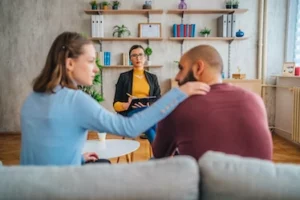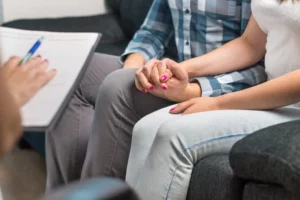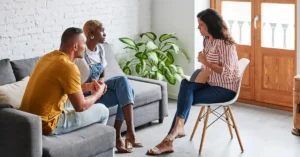In today’s fast-paced world, maintaining a healthy and fulfilling relationship can be challenging. Couples often face a range of issues, from communication breakdowns and unresolved conflicts to trust issues and intimacy concerns. This is where couples counseling plays a crucial role in helping partners navigate these challenges and build stronger, more resilient relationships. If you’re seeking professional guidance to enhance your relationship, you may wonder. In this comprehensive article, we’ll explore the world of couples counseling and its benefits.
Contents
What Is Couple Counseling & How It Works?
 Couple counseling, also learned as couples restorative or marriage counseling, is a form of therapy that desires to help partners resolve variances and improve their connection. It involves assembling with a trained therapist who specializes in working with couples.
Couple counseling, also learned as couples restorative or marriage counseling, is a form of therapy that desires to help partners resolve variances and improve their connection. It involves assembling with a trained therapist who specializes in working with couples.
The primary goal of couple counseling is to enhance communication and understanding between partners, while also addressing any underlying issues that may be causing problems in the relationship.
Here are some general points of how couple counseling typically works:
- Setting Goals: The therapist works with the couple to establish clear and realistic goals for therapy. These goals may include improving communication, resolving conflicts, rebuilding trust, or enhancing intimacy.
- Open Communication: The therapist facilitates open and honest communication between partners. They help each partner express their feelings and concerns while ensuring that both individuals feel heard and understood.
- Relationship Patterns: The therapist helps the couple recognize and change negative relationship patterns. They explore underlying dynamics, such as power imbalances, ineffective coping mechanisms, or unresolved past issues, and work towards developing healthier ways of relating.
- Building Empathy and Understanding: The therapist encourages empathy and understanding between partners. They help each individual see things from the other’s perspective and foster compassion and emotional connection.
- Long-term Maintenance: Once the couple achieves their initial goals, the therapist may focus on long-term maintenance. They help the couple develop strategies to sustain positive changes and provide ongoing support as needed.
What Issues Can Couples Counseling Help With?
 Couples counseling can help address a wide range of issues that couples may face. Here are some common concerns that couples counseling can assist with:
Couples counseling can help address a wide range of issues that couples may face. Here are some common concerns that couples counseling can assist with:
- Trust Issues: Trust is a rudimentary part of a wholesome relationship, and when it is broken, it can lead to significant complications. Couples counseling can help rebuild trust, address issues of unfaithfulness or backstabbing, and establish a foundation of trust and security.
- Intimacy and Sexual Issues: Couples may experience challenges related to intimacy and sexuality, such as a loss of desire, mismatched libido, or difficulties with physical or emotional intimacy. Counseling can facilitate open discussions, explore underlying factors, and help couples enhance their emotional and physical connection.
- Financial Conflicts: Disagreements about money can cause strain in a relationship. Couples counseling can assist in developing financial communication skills, creating shared financial goals, and resolving financial conflicts.
- Parenting Differences: Raising children can bring about differences in parenting styles, values, and approaches. Couples counseling can help parents navigate these differences, find common ground, and develop effective co-parenting strategies.
- Blended Family Challenges: Couples who form blended families often face unique challenges in integrating different family dynamics. Counseling can assist in navigating the complexities of blended families, improving communication among family members, and building a harmonious and supportive family unit.
The Stages Of Couple Counseling
 Couple counseling typically involves several stages, which may vary depending on the therapeutic approach and the needs of the couple. Here are the common stages of couple counseling:
Couple counseling typically involves several stages, which may vary depending on the therapeutic approach and the needs of the couple. Here are the common stages of couple counseling:
- Assessment and Purpose Setting: In the initial stage, the therapist conducts an assessment to gather information about the couple’s history, current challenges, and goals for therapy. The therapist explores the couple’s relationship dynamics, communication patterns, and individual perspectives to gain a comprehensive understanding of the issues.
- Identifying Problematic Patterns: The therapist helps the couple identify recurring patterns of interaction that contribute to conflict or dissatisfaction in the relationship. This may involve exploring communication styles, power dynamics, and underlying emotional dynamics that perpetuate negative cycles.
- Increasing Awareness and Understanding: The therapist helps the couple gain insight into their thoughts, feelings, and behaviors, as well as those of their partner. This stage focuses on increasing self-awareness and empathy, helping each partner understand their contributions to the relationship dynamics.
- Addressing Underlying Issues: In this stage, the therapist delves deeper into underlying issues that may be contributing to the couple’s challenges. This may involve exploring past traumas, unresolved conflicts, attachment styles, or individual psychological issues that impact the relationship.
- Emotionally Connecting and Rebuilding Intimacy: The therapist works with the couple to foster emotional connection and rebuild intimacy. This stage focuses on enhancing emotional closeness, deepening trust, and promoting intimacy and affection within the relationship.
- Consolidation and Maintenance: As therapy progresses and the couple achieves their goals, the therapist helps the couple consolidate their progress and develop strategies to maintain positive changes in the long term. This may involve discussions about relapse prevention, ongoing communication techniques, and self-care practices.
It’s important to note that these stages are not rigid and linear. The therapist adapts the process to the unique needs and progress of the couple and may revisit or overlap different stages as necessary. The duration of each stage can vary depending on the complexity of the issues and the couple’s progress.
Tips To Find The Best Couples Counseling Near You
 Finding the best couples counseling can greatly contribute to the success of your therapy. Here are some tips to help you find the right therapist:
Finding the best couples counseling can greatly contribute to the success of your therapy. Here are some tips to help you find the right therapist:
- Seek Recommendations: Ask trusted friends, family members, or healthcare professionals for recommendations. Personal referrals can provide valuable insights, and firsthand experiences that can guide your decision while giving you valuable advice.
- Research Therapists: Conduct online research to find therapists who specialize in couples counseling. Explore their websites or online profiles to learn about their qualifications, experience, therapeutic approach, and areas of expertise. Look for therapists who have experience working with issues similar to yours.
- Check Credentials: Ensure that the therapist is licensed or certified in your state or country. Professional credentials such as Licensed Marriage and Family Therapist (LMFT) or Licensed Professional Counselor (LPC) indicate that the therapist has met specific training and ethical standards.
- Read Reviews or Testimonials: Look for reviews or testimonials from previous clients. This can provide insight into the therapist’s effectiveness and the experiences of others who have worked with them.
- Consider Logistics: Take practical factors into account, such as the therapist’s location, availability, and fees. Determine whether the therapist’s schedule aligns with yours and whether they accept your insurance if that’s a consideration.
- Trust Your Instincts: Trust your gut feeling when choosing a couples therapist. If something doesn’t feel right or you don’t feel a connection during the initial consultation, it may be worth exploring other options.
- Be Open to Change: Remember that finding the best couples counseling may involve trial and error. If you find that the therapist you initially choose isn’t the right fit, don’t hesitate to switch to another therapist who better meets your needs.
Conclusion
Couples counseling offers a valuable opportunity for partners to address relationship issues. While enhancing communication, and building a stronger foundation for their future. Whether you’re facing conflicts or trust issues, or simply want to deepen your connection. Couples counseling can provide the guidance and support you need. By seeking out a couples counselor near you and embarking on this journey together. You can cultivate a healthier, more fulfilling relationship. Remember, relationships require effort, but with the right tools and professional guidance, you can overcome challenges and create a stronger bond with your partner.
Addressing and resolving couple of issues is essential for a strong and lasting partnership. If you have any queries regarding Online Couple Counseling experienced therapists at CoupleMantra can help. Book a trial couple therapy session.


